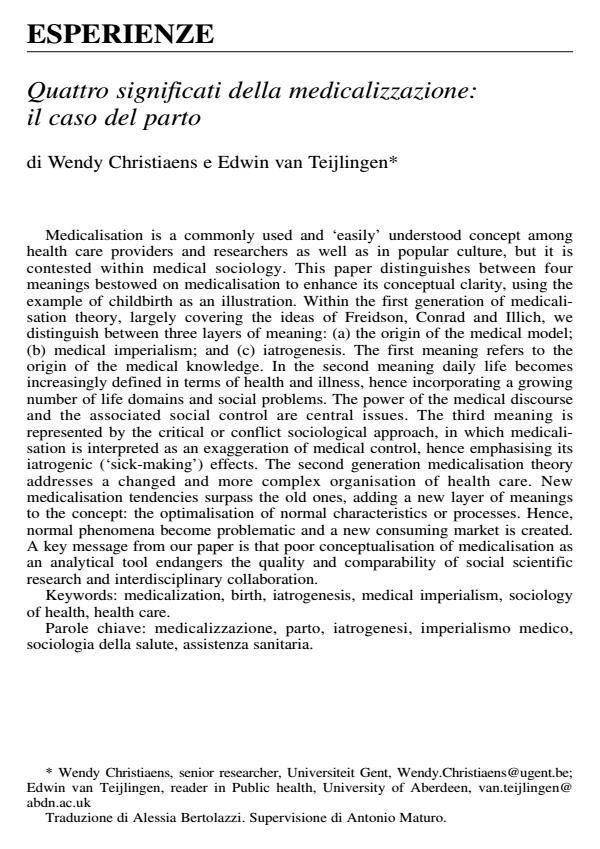Quattro significati della medicalizzazione: il caso del parto
Titolo Rivista SALUTE E SOCIETÀ
Autori/Curatori Wendy Christiaens, Edwin van Teijlingen
Anno di pubblicazione 2009 Fascicolo 2009/2 Lingua Italiano
Numero pagine 20 P. 133-152 Dimensione file 97 KB
DOI 10.3280/SES2009-002009
Il DOI è il codice a barre della proprietà intellettuale: per saperne di più
clicca qui
Qui sotto puoi vedere in anteprima la prima pagina di questo articolo.
Se questo articolo ti interessa, lo puoi acquistare (e scaricare in formato pdf) seguendo le facili indicazioni per acquistare il download credit. Acquista Download Credits per scaricare questo Articolo in formato PDF

FrancoAngeli è membro della Publishers International Linking Association, Inc (PILA)associazione indipendente e non profit per facilitare (attraverso i servizi tecnologici implementati da CrossRef.org) l’accesso degli studiosi ai contenuti digitali nelle pubblicazioni professionali e scientifiche
Quattro significati della medicalizzazione: il caso del parto - Medicalisation is a commonly used and ‘easily’ understood concept among health care providers and researchers as well as in popular culture, but it is contested within medical sociology. This paper distinguishes between four meanings bestowed on medicalisation to enhance its conceptual clarity, using the example of childbirth as an illustration. Within the first generation of medicalisation theory, largely covering the ideas of Freidson, Conrad and Illich, we distinguish between three layers of meaning: (a) the origin of the medical model; (b) medical imperialism; and (c) iatrogenesis. The first meaning refers to the origin of the medical knowledge. In the second meaning daily life becomes increasingly defined in terms of health and illness, hence incorporating a growing number of life domains and social problems. The power of the medical discourse and the associated social control are central issues. The third meaning is represented by the critical or conflict sociological approach, in which medicalisation is interpreted as an exaggeration of medical control, hence emphasising its iatrogenic (‘sick-making’) effects. The second generation medicalisation theory addresses a changed and more complex organisation of health care. New medicalisation tendencies surpass the old ones, adding a new layer of meanings to the concept: the optimalisation of normal characteristics or processes. Hence, normal phenomena become problematic and a new consuming market is created. A key message from our paper is that poor conceptualisation of medicalisation as an analytical tool endangers the quality and comparability of social scientific research and interdisciplinary collaboration.
Keywords: medicalization, birth, iatrogenesis, medical imperialism, sociology of health, health care.
Parole chiave: medicalizzazione, parto, iatrogenesi, imperialismo medico, sociologia della salute, assistenza sanitaria.;
Wendy Christiaens, Edwin van Teijlingen, Quattro significati della medicalizzazione: il caso del parto in "SALUTE E SOCIETÀ" 2/2009, pp 133-152, DOI: 10.3280/SES2009-002009